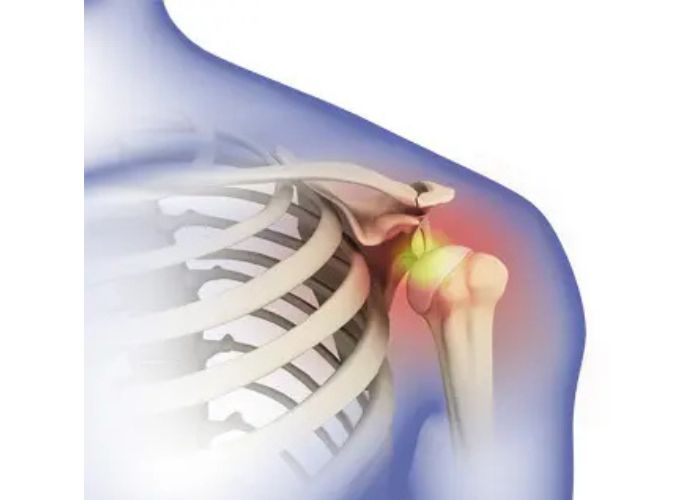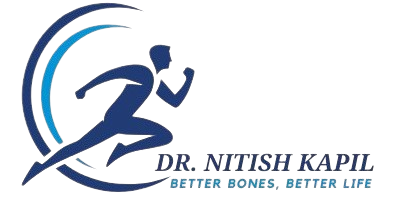
Book An Appointment
Shoulder Dislocation
The shoulder joint is one of the most mobile and versatile joints in the human body, allowing a wide range of motion. However, this flexibility also makes it more prone to injuries, such as dislocations. Shoulder dislocation occurs when the upper arm bone (humerus) is forced out of its socket (glenoid). This can happen due to trauma, sports injuries, falls, or even sudden, forceful movements. Once dislocated, the shoulder becomes unstable and is more likely to dislocate again if not properly treated.
Shoulder dislocations can vary in severity. A partial dislocation (subluxation) occurs when the bone is only partially out of the socket, while a complete dislocation involves the bone being entirely displaced. Both conditions can lead to significant pain, swelling, and limited movement, making prompt medical attention essential. Treatment focuses on repositioning the shoulder joint, relieving pain, and restoring stability to prevent future dislocations.
How Dr. Nitish Kapil Helps with Shoulder Dislocation
Dr. Nitish Kapil is a renowned Orthopaedic surgeon with extensive experience in treating shoulder dislocations. He employs advanced techniques and a patient-focused approach to ensure a smooth recovery and long-term stability. Here’s how he addresses shoulder dislocation treatment:
Accurate Diagnosis
Dr. Nitish Kapil conducts a thorough physical examination and utilizes imaging techniques like X-rays or MRIs to assess the extent of the injury. This step helps determine whether the dislocation is partial or complete and identifies any associated injuries, such as ligament tears or fractures.
Closed Reduction
In many cases, Dr. Nitish Kapil performs a non-surgical procedure called closed reduction to gently guide the displaced bone back into its socket. This process provides immediate pain relief and restores the joint’s function.
Surgical Intervention
For recurrent dislocations or cases involving significant damage to the surrounding ligaments or bones, Dr. Nitish Kapil may recommend surgical options. Procedures like arthroscopic shoulder stabilization or open surgery aim to repair damaged tissues and strengthen the joint.
Rehabilitation
Post-treatment, Dr. Nitish Kapil collaborates with physiotherapists to create a customized rehabilitation program. This program focuses on strengthening the shoulder muscles, improving joint stability, and regaining full range of motion.
Preventive Guidance
Dr. Nitish Kapil emphasizes the importance of preventive care, providing guidance on exercises and lifestyle adjustments to reduce the risk of future dislocations.
Through his expertise, Dr. Nitish Kapil ensures individuals regain shoulder stability and mobility, allowing them to return to their daily activities without fear of reinjury.
Symptoms of Shoulder Dislocation
- 1. Intense pain in the shoulder, especially during movement
- 2. A visibly deformed or misaligned shoulder joint
- 3. Swelling, bruising, or tenderness around the shoulder
- 4. Difficulty moving the arm or a sensation of the shoulder "slipping" out of place
- 5. Weakness, numbness, or tingling in the arm, shoulder, or neck
Solutions for Shoulder Dislocation
Immediate Care
Avoid attempting to move or reposition the shoulder without professional help. Immobilize the arm and seek medical attention immediately.
Non-Surgical Treatment
Closed reduction is often the first step to realign the shoulder joint. Pain relief medications and rest are also part of initial treatment.
Rehabilitation
A structured program of physiotherapy is crucial to rebuild strength, improve joint stability, and prevent future dislocations.
Surgical Options
For chronic or complex dislocations, surgery may be necessary to repair damaged tissues and stabilize the joint. Procedures like Bankart repair or Latarjet surgery are commonly used for recurring dislocations.
Preventive Measures
Strengthening shoulder muscles, avoiding repetitive stress, and practicing proper techniques during physical activities can reduce the risk of dislocation.
Dr. Nitish Kapil’s comprehensive care ensures effective treatment for shoulder dislocations, helping individuals regain strength, stability, and confidence in their shoulder function.




